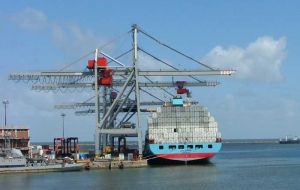MercoPress. South Atlantic News Agency
IMF recommends Latam fiscal savings to address persistent capital inflows
 The region is exiting the world recession faster than expected
The region is exiting the world recession faster than expected Latin America is exiting from the global financial crisis faster than anticipated, and should use the opportunity to boost fiscal savings that can slow inflation and prevent overheating, the IMF said Wednesday.
The IMF World Economic Outlook raised to 5.7% its forecast for economic growth in Latin America and the Caribbean this year. Next year, growth should slow to 4%. In July, the IMF forecast a regional expansion of 4.8% this year and 4% in 2011.
“Given policy challenges arising from strong and persistent capital inflows in some economies, fiscal tools are likely better options to deal with overheating pressures than monetary tools,” the IMF said.
Brazil, Chile, Colombia and Peru should see a “robust” recovery surpassing regional trends as a result of improvements in economic policies over the past two decades, easy access to external financing and strong commodity prices, the IMF said.
Economic growth in Brazil will reach 7.5% this year before slowing to 4.1% next year, the IMF said. In July, the IMF said Latin America’s biggest economy would expand 7.1% this year.
Peru’s economy should expand 8.3% this year, the fastest among the region’s major economies, surpassed only by an expected 8.5% expansion in Uruguay and 9% growth in Paraguay. Argentina, the region’s second-biggest economy, should reach 7.5%, the IMF said.
In 2011, economic growth in Latin America and the Caribbean should slow to 4%, led by 6% growth in both Chile and Colombia. The two economies are expected to expand 5% and 4.7% this year respectively.
Mexico is experiencing a “steady recovery” though it faces larger risks than commodity producers in South America because of its stronger trade links to the U.S., the IMF said. With 80% of its financial system’s assets owned by global banks, Mexico may also see higher capital charges arising from global financial regulatory reform, the IMF said.
After an estimated 6.5% contraction last year, Mexico’s economy should expand 5% this year and 3.9% in 2011, the IMF said. In July, the IMF estimated growth of 4.5% this year and 4.4% in 2011 for Mexico.
Venezuela, the only country in the region still in recession, will continue to be constrained by “severe supply bottlenecks” and a “weak policy framework,” the IMF said. The country’s economy is expected to shrink 1.3% this year before returning to growth of 0.5% in 2011.
A slow recovery of tourism, remittances sent by immigrants and high debt burdens should subdue growth in most Caribbean countries. Growth in the Caribbean should average 2.4% this year, and 3.7% in 2011, below the rest of Latin America.




Top Comments
Disclaimer & comment rules-

Read all commentsThe IMF does not have a particularly good record when it comes to the economy of countries that follow its advice to the letter. In fact, a number of countries seem to have been better off ignoring those recommendations. Argentina, my country, and Malaysia are prime examples. Let's take a close look at Europe's economy and see what IFM recommendations are all about. But I wouldn't ignore IFM recommendations and the IMF altogether, I would listen to what the IFM has to say, and I'd do nothing but only what I think is best for my country.
Oct 07th, 2010 - 04:59 am 0Commenting for this story is now closed.
If you have a Facebook account, become a fan and comment on our Facebook Page!